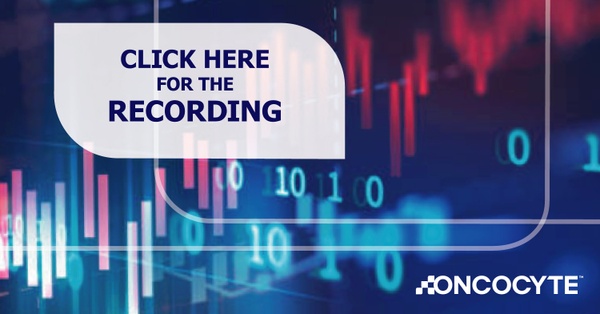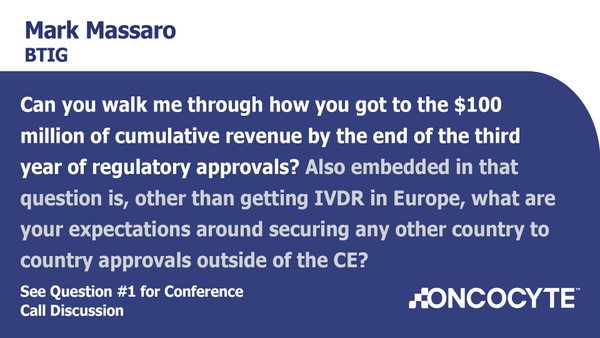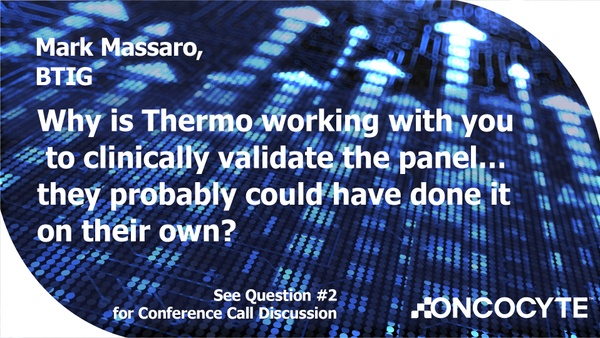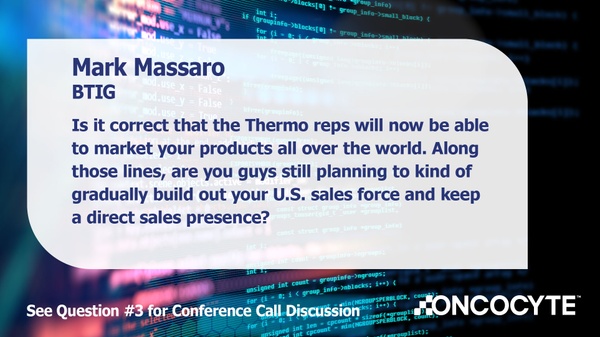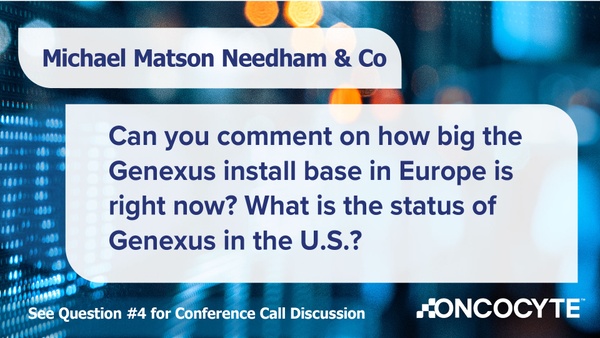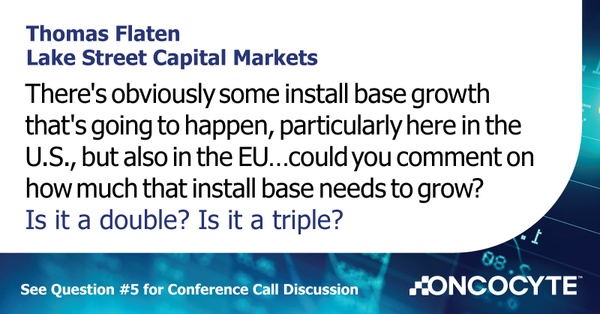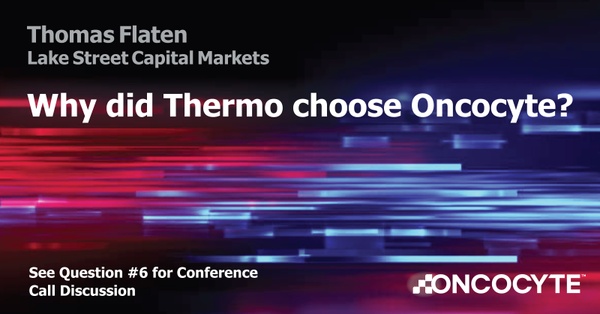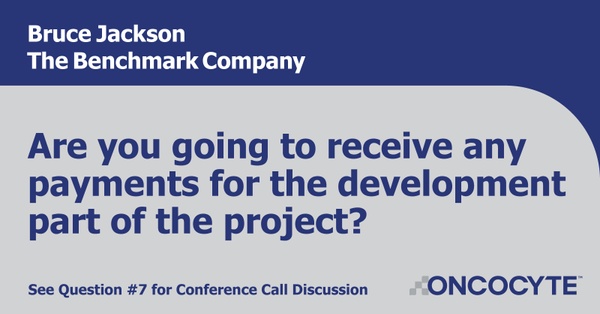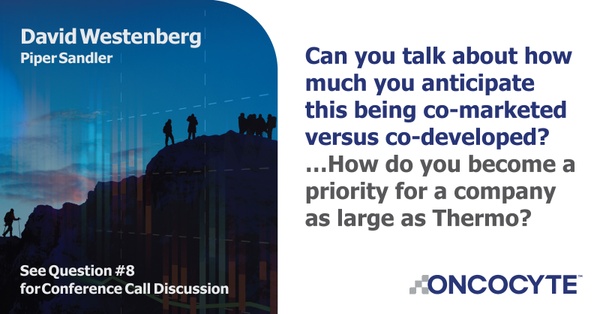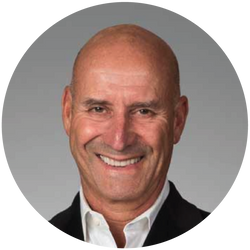
Ronald Andrews
Welcome, everyone, to today's call. We're very excited to walk you through what we believe is a transformational opportunity for our Company. Today, as Bob mentioned, given the timeframe for regulating various products, we are going to be talking and giving a number of forward-looking statements, so we just want to reiterate that as we head in.
To kick-off, on the slide presentation, we'll be walking you through a series of slides today to frame the importance of the opportunity, the timing of the opportunity, and give you folks a chance to ask key questions about the relationship.

Today, we are announcing a transformational global partnership. Thermo Fisher Scientific is a global leader in molecular diagnostic testing. They have well over 10,000 various types of instruments placed from PCR, digital PCR, and next-gen sequencing across the gamut of disease areas. They are one of the largest manufacturers of primers and probes for molecular kit development. So we feel like we've chosen, and they've chosen, really good partners. They have a huge install base of next-gen sequencing and PCR instrument. As we think about our Determa tests and the opportunity to develop kits for those products, and the democratized opportunity for U.S. and ex-U.S. deployment, it opens up an opportunity of well over $5 billion globally.
The relationship offers Oncocyte a robust revenue share for all new Thermo Fisher tests that we will co-develop over the 14-year contract duration. It offers us a double-digit annuity revenue on the Thermo Fisher's current test that we will take through the U.S. regulatory process for FDA and for the IVDR (In Vitro Diagnostic - Regulated) process in Europe. Importantly, it gives us access to Thermo's global sales and support infrastructure, which significantly minimizes our required investment to expand our market outside of the United States. As we've said, upon regulatory approval, the first three years of projected kit revenue will grow from a standing start once the first test is approved, to a cumulative amount of over $100 million at the end of that first 36-month period, a number that we believe is very important for the long-term health of our Company.
If you guys remember two and a half years ago when I got to the Company and stepped in, we laid out this slide as our vision for the content that we would be developing. If you remember the initial strategy and the story that we followed, large-scale genomic testing is very important in helping manage cancer. But there are other key opportunities for reducing those large-scale panels to practice that complement comprehensive profiling. We believe we've built a game-changing portfolio of assays that can be brought through as lab-developed tests here in the United States, but also can be kitted and put into kits and sold on an instrument platform. We have been talking about that partnership potential for well over a year now. Today marks the culmination of a lot of hard work by our team, and by Thermo's team, to bring this to fruition in what we believe will be a very powerful co-marketing and co-development agreement.

This is the first time that a lab and a regional hospital center will have access to all the information they need to manage the complete patient journey, whether it be adjuvant resection of a tumor and identification of the need for chemo, or if the patient can go without chemo, to managing and looking for minimal residual disease, to then in neoadjuvant or later stage tumors, running DetermaIO™ and DetermaTx™, as an LDT. You will see today, that will become Determa Oncomine Comprehensive, or DetermaOC™ in the kitted world, and then monitoring these tests using blood-only CNI monitoring to identify therapeutic response, with the ultimate goal of monitoring for molecular remission.
Today, we're very excited that the portfolio that we put together, the menu we developed over the last two years that we are now launching into the market, will have a home on one of the world's first and leading democratized next-gen sequencing platforms.

What does this do for Oncocyte? Well, first it's a global channel partnership with the leader in clinical molecular testing. It's a $5 billion annual revenue opportunity that's opened up to us now in ex-U.S. global testing for our kitted products. This would not have been available to us without such a partnership. It allows us the benefit as a partner with Thermo in the changing regulatory status around the world to move lab-developed tests and homebrews, as they're affectionately called in Europe, to a more regulated and consistent results environment.
For the global channel partnership, it's important to note that this is a co-development and co-marketing relationship with a very large and very, very well funded global partner. We are going to receive a robust revenue share for all the tests we co-develop. We'll talk more about that first test in a few minutes. It gives us access to a very large installed instrument base. Today, all of our current Determa products that are in next-gen sequencing format have been developed on the current Thermo Fisher instrument, called the GeneStudio™, and we'll talk as we go through today's discussion about the importance of transitioning those tests to kitted products on their brand new Walkaway Genexus instrument.

A very important point for our investors to understand today as well, Thermo Fisher has a pharma services sales team that sells platform capabilities to pharma. If you remember some of the discussions we've had through the years, pharma prefers a distributed model for tests to drive their therapy uptake versus a centralized lab. The idea here is that we can offer the opportunity to democratize a very large panel that could act as a companion diagnostic. So as Thermo's pharma sales team is outselling access to the new Walkaway instrument for decentralization of testing, we get the first right to choose to develop these companion diagnostics for Thermo on Genexus on our 500-gene co-developed panel.
What’s the revenue potential? Well, literally, as you saw the untapped market globally for kitted products is significant. But out of the gate, the opportunity will be focused on regulating the current large panel that Thermo has in the market as research use only test. Regulating and then bringing that through to the regulated instrument platform and converting current test revenues over to a regulated products is a competitive protective hedge for Thermo's base business, but also allows for democratized revenue growth, which we'll explain in a second.
Based on that, plus based on DetermaIO and bringing that through the regulatory cycle to complement Thermo's precision assay in Europe, those revenues, combined with the large panel revenues, can equal and projected over $100 million in cumulative revenues the first three years after we receive regulatory approval for those kits. We'll talk about those timelines in a minute.
The EU has been undergoing a significant transformation in how they manage their regulation of products. In the past, they were way less obtrusive and way less scrutinized for the release of tests in the EU. They were able to operate under what they called a CE Mark environment, where tests could be launched without regulatory approval. They are now, effective in May, entering a new phase called IVDR, In Vitro Diagnostic Regulated, an era where their tests now will need to go through very similar scrutiny for kitted products, as we do in the U.S. with our FDA.
The beauty of that means companies with these types of research use only kits that are being used as homebrew in Europe will now need to find partners or take those products through on their own the regulated process to become an IVDR kit. The beauty of the relationship today is that Oncocyte has a deep bench of experience and capability at regulating these very complex molecular products. Thermo Fisher also has a deep bench in the development of RUO kits and has a regulatory team that complements ours significantly, and we believe that the two teams together can effectively navigate the new regulatory waters and bring regulated products to market in a very efficient manner. If we do this and we do it well, this provides a solid double-digit revenue share back to Oncocyte for the regulated test, and that becomes an annuity revenue stream in the out years for Oncocyte as Thermo Fisher's sales channels sell their large kit.
Why Thermo and why Genexus? Let's spend a little bit—I think it's obvious why Thermo, but let's spend just a second on it. Thermo Fisher has long been focused on serving the patients and serving science in a way that affects patient care. In fact, a few years ago, they were the only company in the sequencing world that made a significant investment to take the research use only platforms that are in the market today and to create a fully automated walkaway version that could literally be put into every hospital in the world.
Today, next-gen sequencing instruments are complicated; the workflows are difficult. Therefore, most of these tests reside in large reference laboratories or large academic laboratories around the world. With the advent of the new Genexus system, which we're going to show some pictures in a second, we now have the chance with Thermo to decentralize complex cancer tests, which helps local communities in multiple ways.
One, it provides access to these game-changing data from comprehensive panels in a very rapid turnaround. Today, large labs like Foundation Medicine, Guardant, Caris, etc., it takes two to three weeks once those tests are sent out of a local pathology lab to get those results back. By then, the tumor board's already happened, the patient has already been seen, and the first treatment options already been selected. So more often than not, these comprehensive panels come back but they go into the patient file and they're not utilized for the initial drug decision and only utilized once the chosen first-line therapy fails the patient. We now have a chance to do better.
Now, with our tests, and the tests we'll co-develop with Thermo on their decentralized platform, within 48 hours, a patient's record with these comprehensive results will be populated and will be in the hands of the treating physician for real-time decision-making, allowing those important decisions to be made earlier in the disease cycle, and thus save more lives.
It also allows the community pathology and regional pathology labs to participate in the economics that today they're cut out of because these tests go to large regional labs, and those large regional labs bill the insurance companies and therefore receive the reimbursement. So very important opportunity for local pathology labs to participate in a very, very important economic strain.
Why Thermo Fisher Genexus? Well, first off, Thermo Fisher's a leader in molecular testing engineering. Most people may not realize this, but they are one of the world leaders in the manufacturing of molecular kits, primers, and probes that go into that kit. They are one of the largest manufacturers in the world and have been epitomized by the strength of their ability to respond to the COVID-19 challenge as they became one of the major suppliers of primers and probes for testing around the world.
The bottom line is we benefit from that scale. That scale will now allow us to build our kits within an FDA-certified center, manufacturing center, and benefit in the scale that's already going on there.
Plus, we gain access to leading service and support infrastructure. Today, Thermo Fisher has, either distributors or are direct, in almost every country in the world. This allows Oncocyte to tap into their ability to service customers and to support with phone calls in native languages that allow us to penetrate these markets globally.
Why the Genexus instrument? It's the only automated next-gen system today that can be used in regional and community centers. Today, the systems that are in the market, some even have diagnostic approvals, but the workflows take 30 minutes, 40 minutes, an hour and requires a very sophisticated operator, versus what Thermo Fisher is launching in Genexus. We will benefit in this relationship from the well over $100 million Thermo Fisher has invested in instruments and chemistry technologies through the years that have allowed us to come to a point to develop a low-cost, low-sample input and rapid turnaround time instrument that can be deployed in local environments.
This slide shares sort of the challenge that communities are up against today. Today, you see the big blue segment of the pyramid, 80% of patients enter the cancer world, the ecosystem of cancer management, through these community and regional centers, and yet very few of those centers today run these large tests. Most of them are sent to the top of the pyramid, and as I mentioned earlier, it takes time to get those results back. The reason that this is true is one, instrument complexity - the current instruments aren't capable of offering ease of use functionality to democratize. Two, the sample economics have been owned by the larger labs - there has not been a willingness to share in those economics down market. And three, and most importantly, there's no regulated test menu. Most of these labs in the blue area do not have the ability to build their own LDTs, validate those, submit for reimbursement, etc.
What we are able to do by combining our content and our development prowess with Thermo Fisher's investment in a walkaway instrument and new chemistry is we now can decentralize the sequencing opportunity. We will open new revenue streams for pathology labs, and Oncocyte and Thermo, will benefit from these in the U.S. and the EU.

Let's take a quick look at the Genexus instrument. It's a very streamlined instrument combination. On the left here, you see the sample extraction. We have to first get DNA and RNA out of a sample that's automated on this instrument, on the left. And then on the right is the Genexus system. Again, rapid testing results from a single day. From a specimen to report takes less than 20 minutes of tech time. We have assay and throughput flexibility with the new chip configuration, the gene chip that Thermo has developed for this instrument. We get access to the patented AmpliSeq™chemistry, which allows us to conserve tissue. AmpliSeq is a patented capacity to amplify known targets and therefore allowing you to get great fidelity and incredible precision without using a lot of tissue, unlike the larger labs on their larger instruments.
Here's how it works. A tech will take the sample from the tumor block or from blood, they will put it into the sample extraction instrument, that will extract it, put it into an aliquoted tube. The second thing, what happens is then they'll take that tube and they'll put it in the Genexus, they'll go to the touch screen, they'll order the assays that they want to run on that patient, and then within one day or 24 hours, that completed report can be electronically transferred into the electronic medical record and made available for physicians that are managing patients.
The beauty of that platform is that we built our test profile and our menu to work across a platform much like Genexus. The beauty of this content that we talked about so frequently with you through the years is that, today, we are on the cusp of the launch of DetermaIO and DetermaTx in the United States, and this will allow us to flex rapidly and regulate DetermaIO and DetermaTx, which in a kitted format will become DetermaOC, and those two products will be able to sell on to this platform upon regulatory approval. We'll also begin work on the DetermaCNI™ application as soon as the large chip from Thermo Fisher is available later this year.
The bottom line is this decentralized market opportunity is very large for Oncocyte. You can see here DetermaOC, which is, again, our DetermaTx products rebranded in a kitted format as Determa Oncomine Comprehensive, DetermaIO, DetermaCNI, Rx, and Mx™.
As you look at these opportunities, these are annualized revenue opportunities from the global kit Total Addressable Market (TAM) and take into account the kitted average unit price versus the end-user reimbursed price. This allows us to leverage Thermo Fisher's global channel and to deliver large revenue opportunities for Oncocyte once we get these products through the regulatory process.

Finally, and then we'll open up for questions, here's the timeline. Developing these regulated products takes time, so it's important that we announce this relationship today and get started with our partner Thermo Fisher so that we can achieve the assorted timelines that we have for both companies. You'll see here our goal is to immediately begin development on the current chip available in Genexus for DetermaIO. We hope to submit that dossier to the European governing bodies for regulatory by the end of the year.
In the meantime, we will be working closely with Thermo Fisher on their large chip. Once the large chip is available for clinical use, which we believe will be late this year, we'll begin the IVD process for DetermaOC in early 2023. From there, we hope late next year we'll get the IVDR approval for DetermaIO and we begin kit sales in Europe and partner with Thermo's Precision Assay, which they are taking through as we speak. Therefore, in Europe, by the second half of next year, a physician or a laboratory will be able to run on Genexus all the testing they need from Precision assay from Thermo to get the targeted therapy decision and DetermaIO to get the immune therapy decision.
In a very cost-effective walkway manner, by the end of 2023, Europe will be able to decentralize all the testing required to select either targeted or immune therapies. You can see that we plan to bring DetermaCNI on to the development platform upon getting this large chip, and then you can follow out in late '24 and '25 the progress we'll make on these regulatory processes to get these products submitted through the FDA as well as through the European bodies.
The bottom line is it's a very important opportunity for OncoCyte today. We're very excited about, enthusiastic about the work that we'll be doing with Thermo Fisher.
I want to close, before we go to questions, with a few comments though. It's really important to understand when you think about this opportunity that one of the companies that we follow closely and one I'm sure many of you follow closely, Veracyte, paid $40 million in cash upfront and $10 million upfront in stock with an additional $10 million upon release of their first regulated assay on the nCounter®. So, one important thing to note is, because of the power of our content, we were able to negotiate a very, very important contract with a large global manufacturer and supplier like Thermo without having to write an upfront check. Very important for our investors to understand.
Also, it's important, this does not include our transplant product line. Transplant is not next-gen sequencing. It's developed in digital PCR. So the partnership conversations in transplant will continue, and we'll have more to come on that very important opportunity in the future.
Also, keep in mind that the revenue projections we talked about today are kitted revenues, and they will be incremental and complementary to all of our lab-developed tests revenues that we are launching this year out of our California and Nashville labs for the DetermaIO, DetermaTx revenue that we will be—that are tests that we'll be launching this year. The subsequent revenue trails from those tests will be our bottom-line base revenues over the course of the next two years while we push for regulatory approval.
Let me pause there and open the floor up for questions. We appreciate your time today.

Mark Massaro - BTIG
Hi, guys. Thanks for the nice presentation.
Can you maybe walk me through how you got to the $100 million of cumulative revenue by the end of the third year of regulatory approvals? Embedded in that question is, other than getting IVDR in Europe, what are your expectations around securing any other country-to-country approvals outside of the CE?
Ronald Andrews
Mark, thanks and thanks for those questions and hold me accountable for answering. There's a lot in those two questions. Let me start with the revenue build-up. The way we looked at this market is today, Thermo Fisher has done an excellent job today already of placing their current version of their next-gen sequencing instrument, GeneStudio, at the top of the pyramid. And at the top of that pyramid today, last year they published well over a couple of hundred thousand patient reports on their current instrument base with current revenue streams. As Europe evolves with IVDR and they need to convert to regulated products, and as we FDA clear their large panel in the United States and begin the decentralization, we will begin the conversion of those current revenue streams to regulated kit revenue streams, and that's one piece of that revenue growth for us, given the revenue share that comes from that.
The second piece of that growth is DetermaIO in a kitted format on their install base in Europe. If you think about they've launched this thing a little over a year ago, they have a very solid install base today, we expect that to grow as they launch their Precision kit, hopefully, I think in the fall of this year or winter—fall or fourth quarter of this year, we will be regulating IO hopefully, as I said, sometime in '23. So as that happens we'll get to go right into that install base and complement their Precision assay with our immunotherapy decision assay.
That is the lion's share of that first three-year roll-up. It's the conversion of a very large revenue trail today, and a percentage of that in our revenue share, plus the incremental addition of DetermaIO and kits in the European Union and the U.K. Plus, once it's approved in IVDR, we believe that there are other channels, global channels outside of the EU we'll be able to adopt it, and they'll be able to use and sell those kits onto the platform globally.
Mark Massaro
Okay, that's helpful. I guess, as it relates to DetermaTx, which is now going to be branded DetermaOC, my understanding is that that existing panel at Thermo is the Oncomine Precision assay. Can you just confirm that that's currently available as an LDT for both tissue and blood? And why are they working with you to clinically validate the panel, because I understand they probably could have done it on their own, perhaps?
Ronald Andrews
Yes, some great questions. Let me try to take them apart here. The Precision assay is the European version of their panel. In Europe today the market dynamic market is this. They don't pay for the large panel unless the Precision or smaller targeted panel doesn't solve the decision dilemma. If it doesn't, then they'll reflex to these large comprehensive panels and they'll pay for those. So, the reimbursing bodies in Europe only pay for the small panel. Traditionally, that small panel has been run in an RUO version on the GeneStudio in European clinical labs. As IVDR comes into fruition, they're going to be launching Genexus as an IVDR approved instrument and their Precision kit will become an IVDR and will complement that with DIO in Europe.
In the United States, they have a very large panel called the Oncomine Comprehensive assay that has been sold as an RUO and is run as an LDT across numerous labs in the United States. The plan here is, if you think about it, those labs are large labs like MD Anderson and places like that. The goal here though is to minimize the length of time it takes to get results back to communities. So Genexus in the United States, once the kit as regulated, Oncomine Comprehensive is regulated, we’ll now begin to go to the source of those sample requests that are going to places like Foundation Medicine, Caris, Tempus, etc., and the lab that's sending it out will now run it in-house. So that is a different dynamic.
Over my almost 40 years in diagnostics, every technology functionality has democratized. In my early years, it was clinical chemistry, then it was immunochemistry with Abbott, democratizing that, then it was microbiology, then it was blood banking with Immucor, and then it was PCR with Roche, and now this is the next natural phase for democratization for testing that's this complex in the United States.
The idea is to go to the source of the samples, and not try to compete at the top of the market with just another kit on a large Alumina box.
Mark Massaro
Okay, and then maybe my last question. Obviously, this looks like a global co-marketing agreement. Is it right that the Thermo reps will now be able to market your products all over the world? I assume it's probably north of 50 or 60 countries, but also in the United States. Along those lines, are you guys still planning to kind of gradually build out your U.S. sales force and keep a direct sales presence?
Ronald Andrews
Great question. Let's start with that question first. Our lab-developed test business will not change. We will grow our sales force, we will sell as an LDT in the United States, the reimbursement is, as you know, very powerful for us, and part of our long-term plan is to be one of the dominant players in our space with our proprietary content, getting the full value of the reimbursed dollar that we put in play based on using our lab versus selling a kit in the United States. However, the comprehensive panel that Thermo has, and you asked a great question, why did they partner with us? The reason is that to take these things through regulatory approvals takes a lot of time, energy, and a lot of samples, and Thermo as a manufacturer doesn't always have access to the clinical samples that we as a CLIA lab have access to. Plus, we have incredible experience in regulating these very complex genetic tests here. Many of the people that are here today with me and our team were people that were originally at the Oncomine program when we first regulated the first product in sequencing many years ago for a life tech.
I think the relationship we had through the years you probably know, all of our current assays were built on the GeneStudio and developed on the GeneStudio, so we feel good about our relationship there. So that's sort of the answer to the LDT question.
The question about the global sales channel is, we expect to leverage their global channel. We are going to be co-marketing with them in Europe, in Australia, New Zealand, the United States. So we'll be supporting their sales efforts with what we would call technical marketing expertise. We'll be detailing the oncologists while they're into the pathology detailing the instrument. And the revenue generation opportunity, we'll be out helping them create demand locally for those tests, and that'll be our complement. But outside of the European market and the U.S. market, they will then take our kits through their channels either directly or through their very large distribution network globally.
One important point to note though is we do have an exclusive in China with Burning Rock for DetermaRx. So as we get downstream, if we are able to kit DetermaRx, we will be excluded from the Chinese market on their instrument for DetermaRx. But all the other assays that we have and we are developing that are Determa-based assays have—they will have access to sell for us globally.
Mark Massaro
That sounds terrific. Congrats on the deal. I'll hop back in the queue.
Ronald Andrews
Thanks, Mark.
Operator
Our next question comes from the line of Mike Matson with Needham & Company. Please proceed with your question.
Mike Matson - Needham & Coompany
Yes. Thanks for taking my question. I guess, first, I don't know if you're willing or able to provide this, but I think you said with Genexus that there is an install base in Europe right now. Can you comment on how big that is? Then, what is the status of Genexus in the U.S.? I mean, I don't follow Thermo, so I don't really—I'm not as familiar with the different sequencing platforms.
Ronald Andrews
Yes. They have been working on Genexus as sort of a successor in the lifecycle management of their GeneStudio and also to democratize. I cannot comment on the exact number of instruments. Obviously, for competitive reasons, we've chosen, both Thermo and us, to keep those numbers to ourselves. However, suffice it to say that the current install base is significant enough that if there were to be no more placements, which obviously we don't expect, our revenue trails would still be significant for us in the kitted version across their current install base.
In the U.S., they're in the process of getting their Class II 510(k), and we certainly expect, way ahead of our regulatory approval for the kits, they'll have that approval for the United States. So we will be obviously taking the large Oncomine Comprehensive panel through under their Class II 510(k) for the U.S. once we are ready to go submit to the FDA.
Mike Matson
Okay. Just to be clear, this is a global deal. I mean, I see your timeline there. It talks about FDA and IVD clearances.
Ronald Andrews
Correct.
Mike Matson
Is there any differences between the agreement—any meaningful, I guess I should say, differences in the agreement in the U.S. versus the rest of the world?
Ronald Andrews
Yes, it's a great question, Mike. So, today, the FDA obviously is a regulatory body for the United States, and they're more and more becoming someone that China looks to for guidance in terms of how they approve various products from the U.S. and China. Traditionally before the IVDR regulations went into place, once a product was CE Marked in Europe, you really could sell that product everywhere else but the United States and China. So now, the CE Marking process is in transition to this IVDR process. Our belief today, and we have good reason to believe this, is that when Thermo and us complete the IVDR process for any of our content and instruments, we'll be able to sell it in almost every country in the world, based on those approvals.
Mike Matson
Okay. All right. Then, can you maybe just talk about the difference in the revenue per test for your kitted—these kitted tests versus your lab-developed tests? I imagine the price, your revenues, are going to be lower as well. Maybe the, I guess, gross margin, to the degree you're able to comment on that as well between the two channels.
Ronald Andrews
Yes. Let me kind of walk—it's a great question. It’s important that our investors understand this really important point. As you come down that pyramid that I showed in our slide deck, we have seen through years and years of democratization and decentralization the further down that pyramid you get local labs are willing to share 50% or sometimes more of the reimbursed dollar with the vendor that helps them get into business. So, because of that, today, for instance, let's say that the panels for—the large panels, the comprehensive panels in the United States today are all under blanket LCD, reimbursed somewhere around $2,400. So you can imagine our top-line kit, AUP, our list price would be around $1,200. For proprietary content, those typically fall between the $3,000 and $4,000 range in the U.S. So you can imagine that our kit price for a DetermaIO or a product like DetermaCNI will be somewhere in that $1,500 plus range.
At those list prices, the gross margins for our kits fall way in line with traditional PCR next-gen sequencing kit prices, which through my years, we can't put our finger on today, because we have a lot of work to do to get to this point. But traditionally that's been somewhere between 65% and 75% gross margin for the kit.
Mike Matson
Okay, got it. Thanks. I'll let some others get in some questions. Thanks.
Ronald Andrews
Yes. Thank you, Mike.
Operator
Our next question comes from the line of Thomas Flaten with Lake Street Capital Markets. Please proceed with your question.
Thomas Flaten - Lake Street Capital
Hi, guys. Thanks for taking the question. I was wondering if on your timeline slide you could layer in the $100 million three-year window? Does that window start at the end of 2026, or does it start at the launch of the first product, in terms of adding up those revenues?
Ronald Andrews
Yes, it starts in sort of that early 2025 range and runs through '27.
Thomas Flaten
Got it. Helpful, thanks. Then, just reflecting back on a prior question. There's obviously some install base growth that's going to happen, particularly here in the U.S., but also in the EU. You mentioned even if there's no growth in the install base, you'll still have a nice revenue stream. But if you think about the $100 million number, without getting into specific install base numbers, could you comment maybe on how much that install base needs to grow? Is it a double? Is it a triple? I'm just trying to put into perspective what kind of work Thermo needs to do to get you to the $100 million number.
Ronald Andrews
Yes. Let me see how I can answer this without compromising any of the discussions we've had.
Bottom line is, the current install base will almost get us there, assuming a high percentage of conversion. Because the way that we built the analysis that gets us there is, some of its conversion of a current install base to Genexus and to our kit on Genexus, and some of it is installed base growth. So, if the current install base we got 60%, 70% conversion, you could get to those numbers that way, but that's not how we've gotten to them. We've gotten to them with a conversion each year, a percentage conversion, combined with growth in the install base.
Thomas Flaten
Got it. Then just one final one for me. The Genexus is a pretty pricey instrument. Is there a lower limit or an upper limit depending on how you look at it in terms of the size of the regional clinic or office that would feasibly be able to bring this in-house?
Ronald Andrews
No, it's excluded if they only have one test. One of the reasons—and Mark asked it and I didn't really get to a really good answer. Why did they choose us? Any time you have a piece of hardware that costs that much, you need to have more tests to amortize the cost of the instrument across the reimbursement form, right? So if they only have one test and that's all, then yes, you're limited to sort of a medium, a regional size clinic; but if you start adding DetermaIO, DetermaCNI, which is a monitoring assay that'll be run four, five, six times, as you start to look at the addition of all of the menus that we'll put on there with Thermo, you start to be able to bring it down market and still amortize the instrument cost within a three-year ROI for most of these centers.
Today you're taking a patient reimbursement—for a center today, let's say from a pathology lab and let's say a regional pathology lab in middle Georgia, you're taking $1,000 from that patient to $7,000 reimbursement over time into that pathology lab. So, you can start to see that as you add the menu you create combined revenue potential for each patient within the pathology lab. And over time, by adding these monitoring assays plus DIO, you can start to see the amortization gets a lot easier as you go down the market.
Thomas Flaten
Got it. Appreciate you guys taking the questions. Thanks.
Ronald Andrews
Yes. Thanks, Thomas.
Operator
Our next question comes from the line of Bruce Jackson with The Benchmark Company. Please proceed with your question.
Bruce Jackson - The Benchmark Company
Hi. Congratulations, and thanks for taking my questions.
Ronald Andrews
Yes. Bruce, how are you?
Bruce Jackson
I'm good. In terms of the contract with Thermo Fisher, are you going to receive any payments for the development part of the project?
Ronald Andrews
The payments we will receive for development will be if we choose to bring on their companion diagnostic programs. Those will be billed directly to pharma based on our development opportunity. Plus, there's a couple of key indications of their comprehensive panel that if we are able to conquer, they've been challenging to conquer, and we believe we can. One is BRCA and one is HRD. If we're able to add those, they'll be incremental value back to us for pulling those off.
But Bruce, as I said in the beginning, I think you know this well, Veracyte paid $40 million in cash to get access to a platform, and this is a co-development agreement where we have to pay zero upfront and we're going to apply our capabilities and some co-investment around software and things that will make this instrument work in these lower-level clinics.
It’s that co-development investment that we'll make and it's a co-development they're going to make. As you know, they've already spent well over $100 million to develop this instrument and the chemistry. So we are benefiting from all that without having to write an upfront check like Veracyte did when they did the deal for the nCounter.
Bruce Jackson
Okay, got it. Then with regards to the U.S. LDT for DetermaIO, are you going to be launching that on the GeneStudio platform and then convert over to the Genexus platform, or will you maybe switch over right away?
Ronald Andrews
Yes, we will run DetermaIO in our lab, our LDT lab. We will continue to run that in PCR for the time being, just because the economics are incredibly favorable to us. As volumes grow and as we go into the development of IO for Europe, the development part will be done on the S5 or the GeneStudio, and then we'll cut over to Genexus at some point in the near future to take that through the regulatory process.
Bruce Jackson
Okay, got it. Thank you very much, and congratulations again.
Ronald Andrews
Thanks, Bruce. Thanks for your support.
Operator
Our next question comes from the line of David Westenberg with Piper Sandler. Please proceed with your question.
David Westenberg - Piper Sandler
Hi. Thanks for taking the question, and congrats on this deal. Can you talk about how much you anticipate this being co-marketed versus co-developed? And if this is indeed co-marketed and not necessarily just a real push from Oncocyte, how do you become a priority for a company as large as Thermo?
Ronald Andrews
Those are great questions. Let me break it down into a couple of pieces. One, it is a co-development and a co-marketing agreement. Most of the development though on their side will be to get us the early phase feasibility on their large chip. We'll then take it from there under our design control, combined with their design control, that quality system will be shared, and then we'll take it to the FDA and we will launch it as an FDA cleared kit. They will actually take it to market and sell it. We will do some co-marketing for them and with them for the comprehensive panel. For DetermaIO and all the Determa products, it is truly a—we will develop it completely, and then they will co-market it with us, and then they will be the front line sales organization ex-U.S. to sell it on their platform. So that's the plan today.
Why is this important enough to them? Their clinical sequencing division is a separate business division for Thermo Fisher operating in the clinical sequencing world. Today, that group has traditionally been selling RUO products. When they made the investment and the commitment three years ago to invest in what is now Genexus, they made a full commitment to become an IVD platform company and to sell IVD content. The challenge within Thermo about them being an individual division is they have to manage a P&L within Thermo and contribute their committed EBIT back to the organization, which means they need to find partners for content development. This is not unusual in the world of large instrument companies. In my years at Roche, we did similar things. And so it happens in that world. You've got a platform, you need a lot of content, you can only build so much yourself, you find a partner.
The fact that they've chosen us for oncology, for me, is incredibly exciting for my team and our team. We spent many years developing content in the space, many years bringing content to market, a lot of it was for the original GeneStudio, and now that they've chosen us to partner with them, I can assure you it's a really important partnership for them as it is for us, because without our content and without this additional content, in Europe, they have no way to identify immune therapy decisions, which is critical as you know today, as the world emerges to more and more use of immune therapy, and they need multiple menu items to amortize an expensive piece of equipment down market.
We are very important to them, they're very important to us, thus the transformational nature of this relationship.
David Westenberg
Got you. I appreciate it. Then, can you talk about some of the maybe incremental spend, incremental effort, and if there's anything maybe being de-prioritized to think about in order to really go run with this? Sorry if that was already covered.
Ronald Andrews
No, it wasn't. It wasn't and it's an important question. I mean, right now, the fact that we are not having to write an upfront check to have access to this platform is critical, because that allows us, in the normal course of our R&D world, to make investments along the way to bring these products to market. So, we don't have a huge capital need to digest today. We will over time invest money.
And the question is, what will we not do? I think the idea here is we'd always planned to take our products and put them into kits with a platform. Those have been budgeted through the next two to three years in our long-range plan. We just weren't sure who the platform company was going to be. Now that we know who it is, now we'll sort of laser in on what are the requirements. The initial investment will be to lease a number of instruments to bring into our facility here so we can get started with Genexus instruments since all the work we've done today has been on the S5 or their GeneStudio.
David Westenberg
Got it. Appreciate it. Thank you so much.
Ronald Andrews
Yes, thank you.
Operator
We have reached the end of the question-and-answer session. I'll now turn the call back over to Ronnie Andrews for closing remarks.
Ronald Andrews
Thanks. Listen, guys, thanks so much for taking the time today. Again, as I said, it's a very important day for our Company. We have a lot to do for our own LDT business. We are more than ever committed to that now, because the more we drive those LDT revenues, the better chance we have at developing the market for these kitted opportunities ex-U.S. So, we're full steam ahead here at Oncocyte to deliver on the commitments. I encourage you to go to our website and pull down the '22 milestone list, that's the checklist for achievement for our Company for the year. It would important for you to keep that handy as more and more things unfold during the year. But we're very excited about this opportunity. We're very fortunate and blessed to be working with a company like Thermo and we look forward to future updates in future calls.
Thanks, everyone, for your time today.
Oncocyte is a precision diagnostics and monitoring company with the mission to improve patient outcomes by providing clear insights that inform critical decisions in the diagnosis, treatment, and monitoring of cancer. The Company, through its proprietary tests and pharmaceutical services business, aims to help save lives by accelerating the diagnosis of cancer and advancing cancer care. The Company’s tests are designed to help provide clarity and confidence to physicians and their patients at every stage. DetermaRx™ identifies early-stage lung cancer patients who are at high risk for cancer recurrence and who may benefit from adjuvant chemotherapy. DetermaIO™, a gene expression test currently used as a research-use only tool, assesses the tumor microenvironment to predict response to immunotherapies. The Company’s pipeline of tests in development also includes DetermaTx™, which will assess mutational status of a tumor, blood-based monitoring test DetermaCNI™, and long-term recurrence monitoring test DetermaMx™. In addition, Oncocyte’s pharmaceutical services provide companies that are developing new cancer treatments with a full suite of molecular testing services to support the drug development process.
DetermaRx™, DetermaIO™, DetermaTx™, DetermaCNI™, DetermaMx™, and TheraSure™ are trademarks of Oncocyte Corporation.
Oncocyte Forward Looking Statements
For more information, please visit https://oncocyte.com/ or follow us on Twitter at @OncocyteCorp, Facebook, and LinkedIn.

